Moby-Duck
Authors: Donovan Hohn

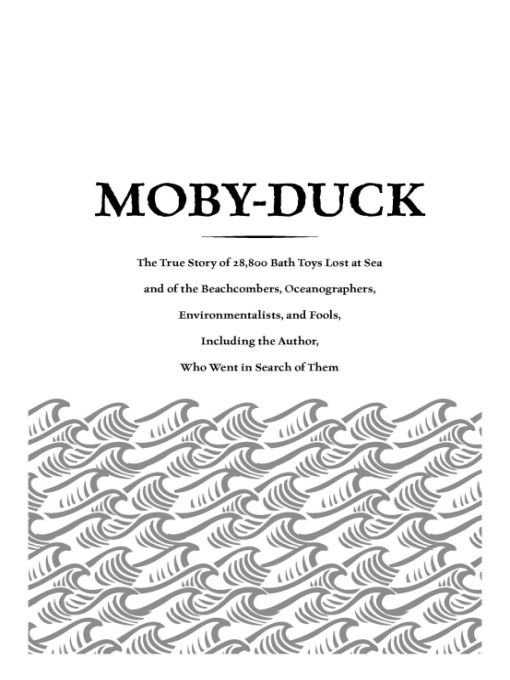
Table of Contents
Â
Â
DONOVAN HOHN
VIKING
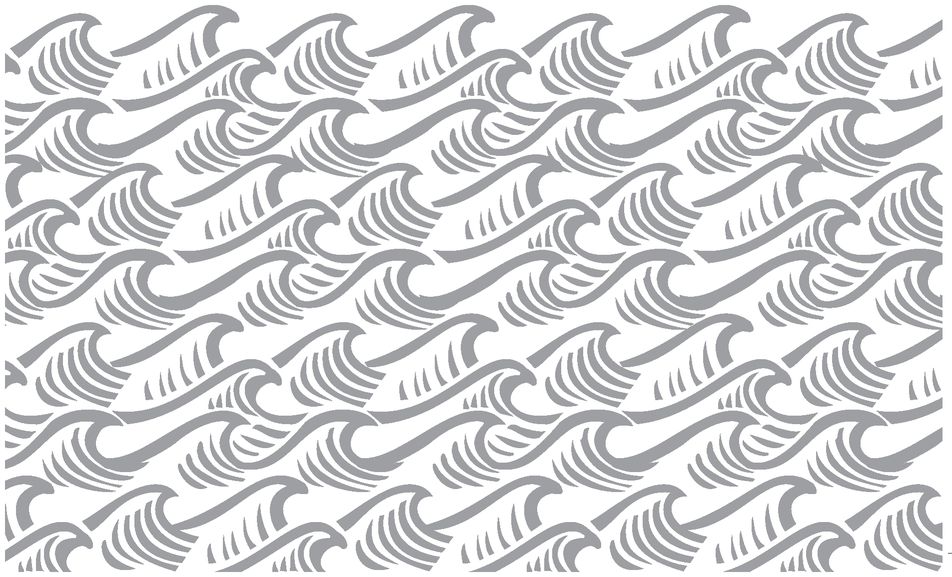
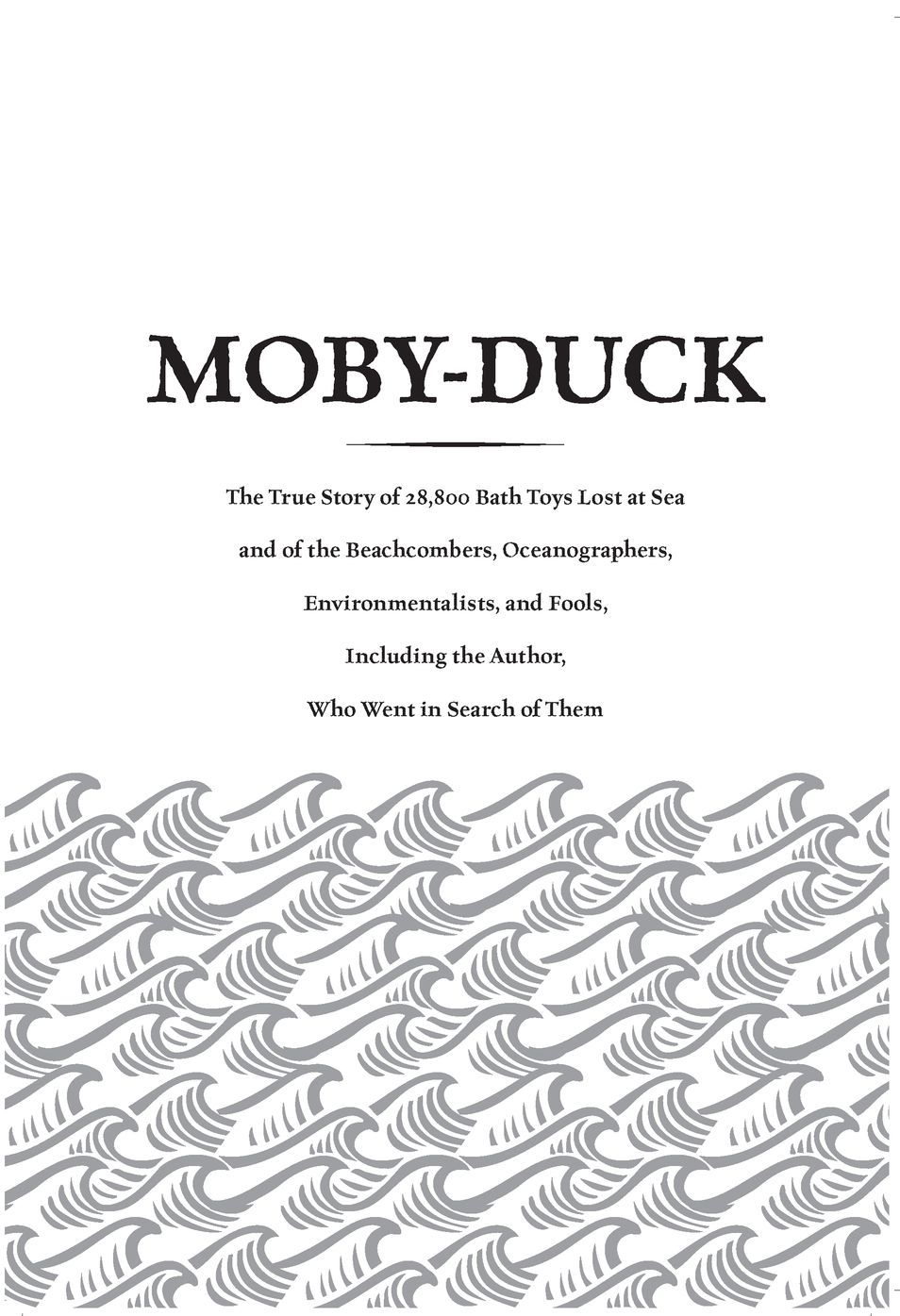
VIKING
Published by the Penguin Group
Penguin Group (USA) Inc., 375 Hudson Street, New York, New York 10014, U.S.A.
Penguin Group (Canada), 90 Eglinton Avenue East, Suite 700, Toronto, Ontario, Canada M4P 2Y3 (a division of Pearson Penguin Canada Inc.)
Penguin Books Ltd, 80 Strand, London WC2R 0RL, England
Penguin Ireland, 25 St. Stephen's Green, Dublin 2, Ireland (a division of Penguin Books Ltd)
Penguin Books Australia Ltd, 250 Camberwell Road, Camberwell, Victoria 3124, Australia (a division of Pearson Australia Group Pty Ltd)
Penguin Books India Pvt Ltd, 11 Community Centre, Panchsheel Park, New Delhiâ110 017, India
Penguin Group (NZ), 67 Apollo Drive, Rosedale, North Shore 0632, New Zealand (a division of Pearson New Zealand Ltd)
Penguin Books (South Africa) (Pty) Ltd, 24 Sturdee Avenue, Rosebank,
Johannesburg 2196, South Africa
Published by the Penguin Group
Penguin Group (USA) Inc., 375 Hudson Street, New York, New York 10014, U.S.A.
Penguin Group (Canada), 90 Eglinton Avenue East, Suite 700, Toronto, Ontario, Canada M4P 2Y3 (a division of Pearson Penguin Canada Inc.)
Penguin Books Ltd, 80 Strand, London WC2R 0RL, England
Penguin Ireland, 25 St. Stephen's Green, Dublin 2, Ireland (a division of Penguin Books Ltd)
Penguin Books Australia Ltd, 250 Camberwell Road, Camberwell, Victoria 3124, Australia (a division of Pearson Australia Group Pty Ltd)
Penguin Books India Pvt Ltd, 11 Community Centre, Panchsheel Park, New Delhiâ110 017, India
Penguin Group (NZ), 67 Apollo Drive, Rosedale, North Shore 0632, New Zealand (a division of Pearson New Zealand Ltd)
Penguin Books (South Africa) (Pty) Ltd, 24 Sturdee Avenue, Rosebank,
Johannesburg 2196, South Africa
Â
Penguin Books Ltd, Registered Offices: 80 Strand, London WC2R 0RL, England
Â
First published in 2011 by Viking Penguin, a member of Penguin Group (USA) Inc.
Â
Â
Copyright © Donovan Hohn, 2011All rights reserved
Â
Portions of this book first appeared in
Harper's, The New York Times Magazine,
and
Outside.
Harper's, The New York Times Magazine,
and
Outside.
Â
Map illustrations by David Cain
Â
LIBRARY OF CONGRESS CATALOGING IN PUBLICATION DATA
Hohn, Donovan.
Moby-duck : an accidental odyssey : the true story of 28,800 bath toys lost at sea and of the beachcombers, oceanographers, environmentalists, and fools, including the author, who went in search of them / Donovan Hohn.
p. cm.
eISBN : 978-1-101-47596-6
1. Ocean currents. 2. Marine debris. 3. Plastic toys. 4. Hohn, DonovanâAnecdotes. I. Title.
GC231.2.H65 2010
551.46'2âdc2 2010033608
551.46'2âdc2 2010033608
Â
Â
Without limiting the rights under copyright reserved above, no part of this publication may be reproduced, stored in or introduced into a retrieval system, or transmitted, in any form or by any means (electronic, mechanical, photocopying, recording or otherwise), without the prior written permission of both the copyright owner and the above publisher of this book.
Â
The scanning, uploading, and distribution of this book via the Internet or via any other means without the permission of the publisher is illegal and punishable by law. Please purchase only authorized electronic editions and do not participate in or encourage electronic piracy of copyrightable materials. Your support of the author's rights is appreciated.
For Beth,
and for my father,
and for my sons.
and for my father,
and for my sons.
Facing west from California's shores,
Inquiring, tireless, seeking what is yet unfound,
I, a child, very old, over waves, towards the house of maternity,
the land of migrations, look afar . . .
Inquiring, tireless, seeking what is yet unfound,
I, a child, very old, over waves, towards the house of maternity,
the land of migrations, look afar . . .
âWalt Whitman
Â
There are more consequences to a shipwreck than the underwriters notice.âHenry D. Thoreau
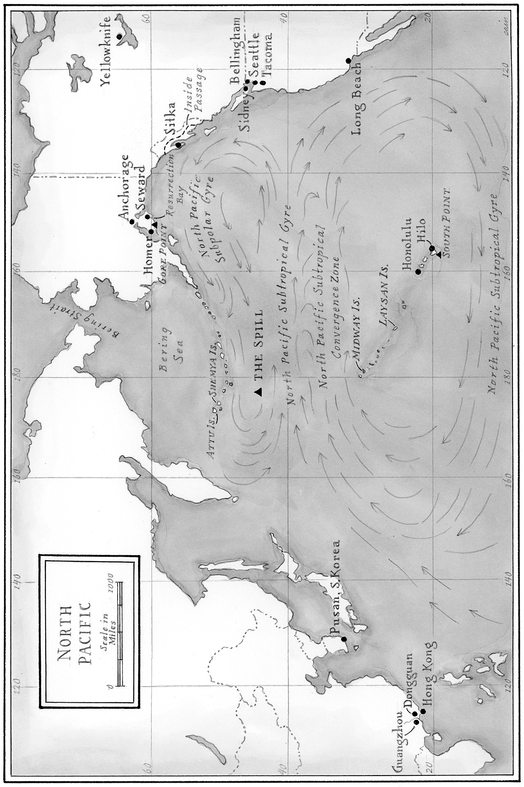
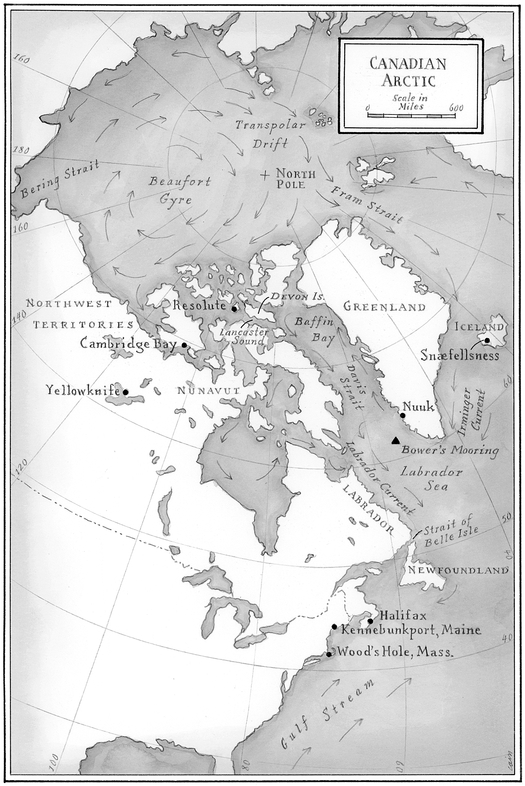
PROLOGUE

At the outset, I felt no need to acquaint myself with the six degrees of freedom. I'd never heard of the Great North Pacific Garbage Patch. I liked my job and loved my wife and was inclined to agree with Emerson that travel is a fool's paradise. I just wanted to learn what had really happened, where the toys had drifted and why. I loved the part about containers falling off a ship, the part about the oceanographers tracking the castaways with the help of far-flung beachcombers. I especially loved the part about the rubber duckies crossing the Arctic, going cheerfully where explorers had gone boldly and disastrously before.
At the outset, I had no intention of doing what I eventually did: quit my job, kiss my wife farewell, and ramble about the Northern Hemisphere aboard all manner of watercraft. I certainly never expected to join the crew of a fifty-one-foot catamaran captained by a charismatic environmentalist, the Ahab of plastic hunters, who had the charming habit of exterminating the fruit flies clouding around his stash of organic fruit by hoovering them out of the air with a vacuum cleaner.
Certainly I never expected to transit the Northwest Passage aboard a Canadian icebreaker in the company of scientists investigating the Arctic's changing climate and polar bears lunching on seals. Or to cross the Graveyard of the Pacific on a container ship at the height of the winter storm season. Or to ride a high-speed ferry through the smoggy, industrial backwaters of China's Pearl River Delta, where, inside the Po Sing plastic factory, I would witness yellow pellets of polyethylene resin transmogrify into icons of childhood.
I'd never given the plight of the Laysan albatross a moment's thought. Having never taken organic chemistry, I didn't know and therefore didn't care that pelagic plastic has the peculiar propensity to adsorb hydrophobic, lipophilic, polysyllabic toxins such as dichlorodiphenyltrichloroethane (a.k.a. DDT) and polychlorinated biphenyls (a.k.a. PCBs). Nor did I know or care that such toxins are surprisingly abundant at the ocean's surface, or that they bioaccumulate as they move up the food chain. Honestly, I didn't know what “pelagic” or “adsorb” meant, and if asked to use “lipophilic” and “hydrophobic” in a sentence I'd have applied them to someone with a weight problem and a debilitating fear of drowning.
If asked to define the “six degrees of freedom,” I would have assumed they had something to do with existential philosophy or constitutional law. Now, years later, I know: the six degrees of freedomâdelicious phrase!âare what naval architects call the six different motions floating vessels make. Now, not only can I name and define them, I've experienced them firsthand. One night, sleep-deprived and nearly broken, in thirty-five-knot winds and twelve-foot seas, I would overindulge all sixârolling, pitching, yawing, heaving, swaying, and surging like a drunken libertineâand, after buckling myself into an emergency harness and helping to lower the mainsail, I would sway and surge and pitch as if drunkenly into the head, where, heaving, I would liberate my dinner into a bucket.
At the outset, I figured I'd interview a few oceanographers, talk to a few beachcombers, read up on ocean currents and Arctic geography, and then write an account of the incredible journey of the bath toys lost at sea, an account more detailed and whimsical than the tantalizingly brief summaries that had previously appeared in news stories. And all this I would do, I hoped, without leaving my desk, so that I could be sure to be present at the birth of my first child.
Â
Â
But questions, I've learned since, can be like ocean currents. Wade in a little too far and they can carry you away. Follow one line of inquiry and it will lead you to another, and another. Spot a yellow duck dropped atop the seaweed at the tide line, ask yourself where it came from, and the next thing you know you're way out at sea, no land in sight, dog-paddling around in mysteries four miles deep. You're wondering when and why yellow ducks became icons of childhood. You want to know what it's like inside the toy factories of Guangdong. You're marveling at the scale of humanity's impact on this terraqueous globe and at the oceanic magnitude of your own ignorance. You're giving the plight of the Laysan albatross many moments of thought.
Other books
Poison Penmanship: The Gentle Art of Muckraking by Jessica Mitford
Happy as Larry by Scot Gardner
When Empires Fall by Katie Jennings
Baby Mine by Tressie Lockwood
God's Gift by Dee Henderson
Mockery Gap by T. F. Powys
Tinsel My Heart by Christi Barth
Redeemed by Rubies (A Dance with Destiny Book 6) by JK Ensley, Jennifer Ensley
Drain You by M. Beth Bloom